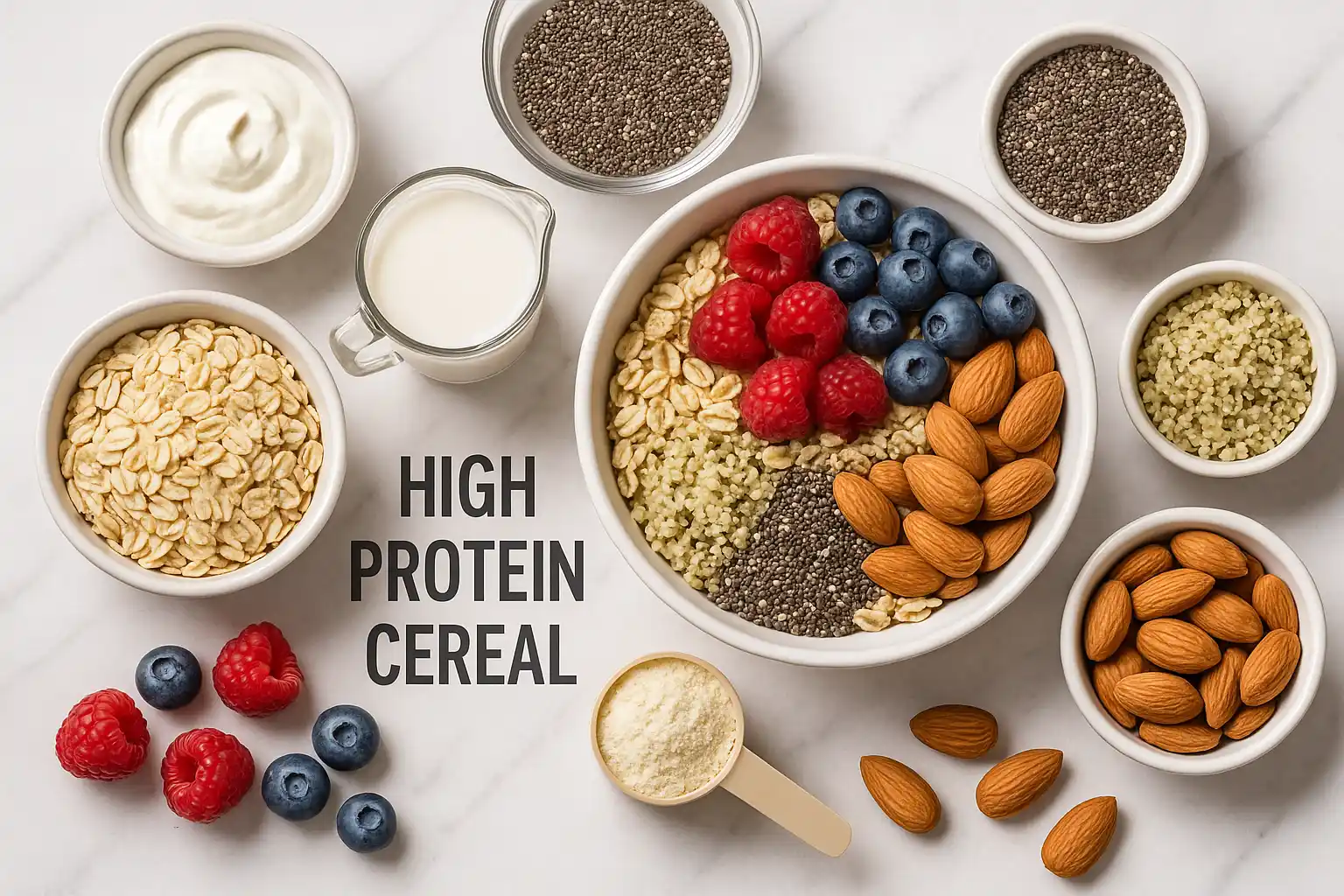Breakfast is often hailed as the most important meal of the day, setting the tone for your energy levels and metabolic rate. For those prioritizing fitness, weight management, or simply sustained energy, the choice of breakfast can be pivotal. While traditional cereals often fall short on nutritional value, the emergence of “high protein cereal” has revolutionized the breakfast landscape. This isn’t just about adding a scoop of protein powder to your bowl; it’s about a fundamental shift towards a breakfast option that truly fuels your body and keeps you satiated. This article will delve into the world of high protein cereal, exploring its benefits, how to choose the best options, and creative ways to incorporate it into your daily routine. We’ll provide practical insights and a delicious recipe to ensure your mornings are as efficient and impactful as a perfectly executed fast break in a high-stakes Game 7 NBA Finals, giving you the sustained energy to dominate your day.
Table of Contents
I. The Power of High Protein Cereal
Protein is a crucial macronutrient, essential for muscle repair and growth, hormone production, and maintaining satiety. Starting your day with a significant protein intake offers numerous advantages:
- Sustained Satiety: Protein keeps you feeling fuller for longer, reducing mid-morning cravings and preventing overeating later in the day.
- Muscle Preservation and Growth: Adequate protein intake, especially after an overnight fast, supports muscle protein synthesis, which is vital for athletes and anyone looking to maintain or build lean mass.
- Stable Blood Sugar: Unlike high-sugar, low-protein cereals that can cause rapid spikes and crashes in blood sugar, high protein cereal helps stabilize glucose levels, leading to more consistent energy throughout the morning.
- Metabolic Boost: Protein has a higher thermic effect of food (TEF) compared to carbohydrates or fats, meaning your body burns more calories digesting it.
Research indicates that a high-protein breakfast can significantly improve appetite control and reduce daily caloric intake, contributing to weight management efforts [1]. This makes high protein cereal an excellent choice for a balanced diet.
II. Choosing and Customizing Your High Protein Cereal
The market for high protein cereal is growing, offering various options. Knowing what to look for and how to customize your bowl can make all the difference.
A. Selecting the Best High Protein Cereal Options
When choosing a pre-packaged high protein cereal, consider these factors:
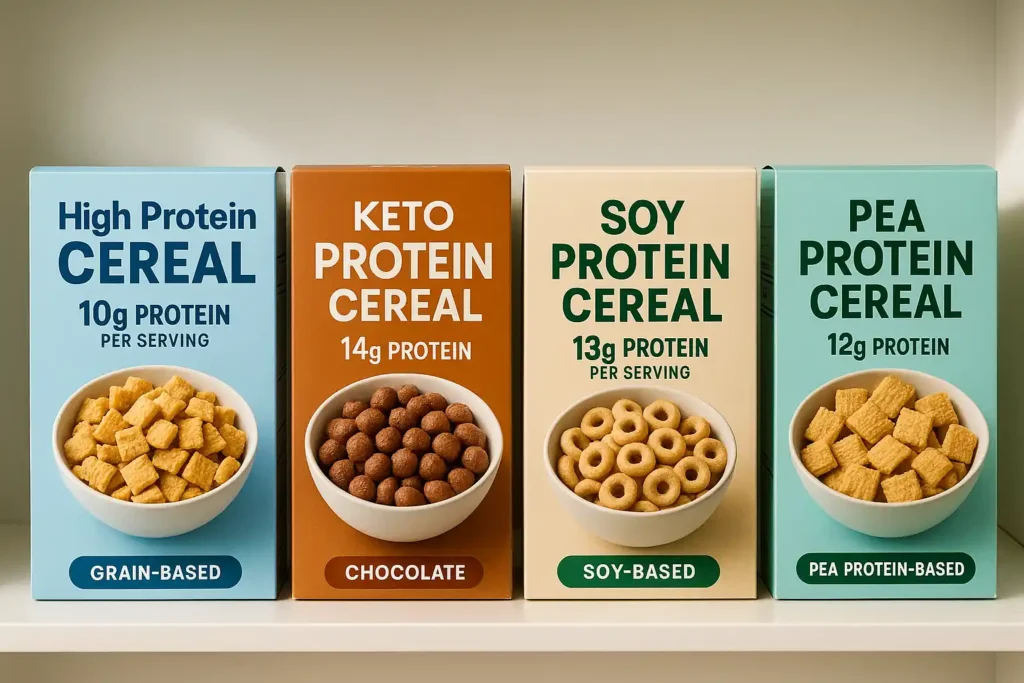
- Protein Content: Aim for at least 10-15 grams of protein per serving. Some brands offer significantly more.
- Sugar Content: Opt for options with low added sugar. Many high protein cereals use natural sweeteners or are unsweetened.
- Fiber Content: Look for cereals rich in fiber, which aids digestion and enhances satiety.
- Ingredient List: Prioritize cereals with whole grains, nuts, seeds, and protein sources like whey, soy, pea protein, or lentils.
B. DIY High Protein Cereal: Building Your Own Bowl
Creating your own high protein cereal allows for ultimate customization and control over ingredients.
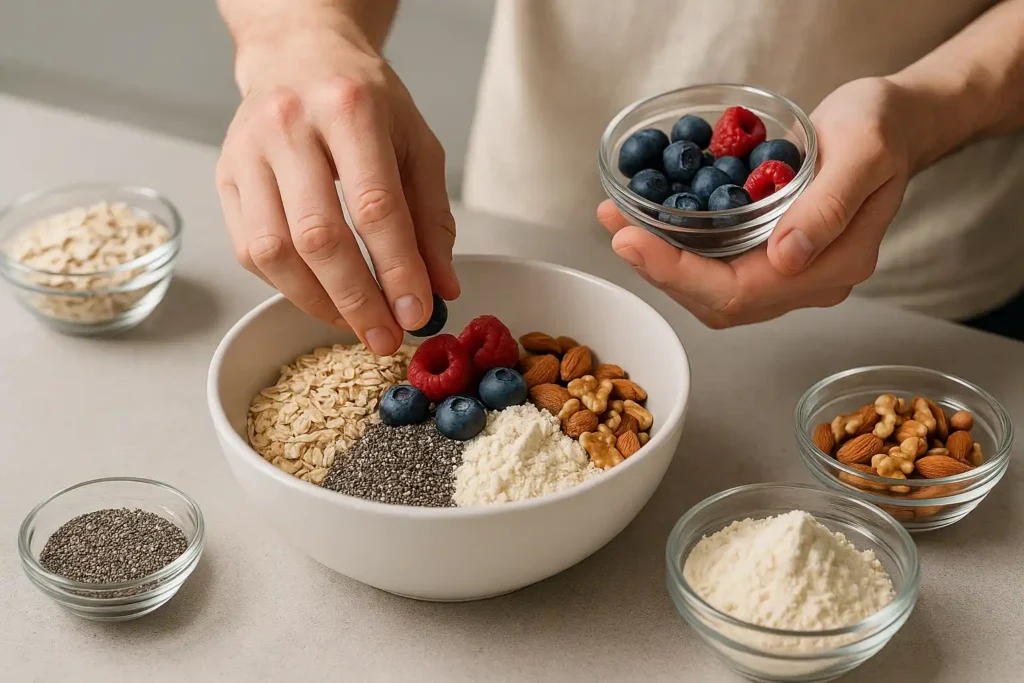
- Base: Start with a whole-grain base like rolled oats, puffed quinoa, or unsweetened shredded wheat.
- Protein Boosters: Incorporate protein powder (whey, casein, or plant-based), chia seeds, hemp seeds, flax seeds, or a dollop of Greek yogurt or cottage cheese.
- Healthy Fats: Add nuts (almonds, walnuts), seeds (pumpkin, sunflower), or a spoonful of nut butter.
- Fiber & Micronutrients: Load up on fresh or frozen berries, sliced banana, or other fruits. A sprinkle of cinnamon or cocoa powder can add flavor without extra sugar.
- Liquid: Use milk (dairy or plant-based) or water. For an extra protein kick, use high-protein milk or a protein shake as your liquid.
III. Featured Recipe: Overnight High Protein Cereal Oats
This recipe is a perfect example of a delicious, convenient, and highly customizable high protein cereal. It’s ideal for meal prep, allowing you to wake up to a ready-to-eat, nutritious breakfast.
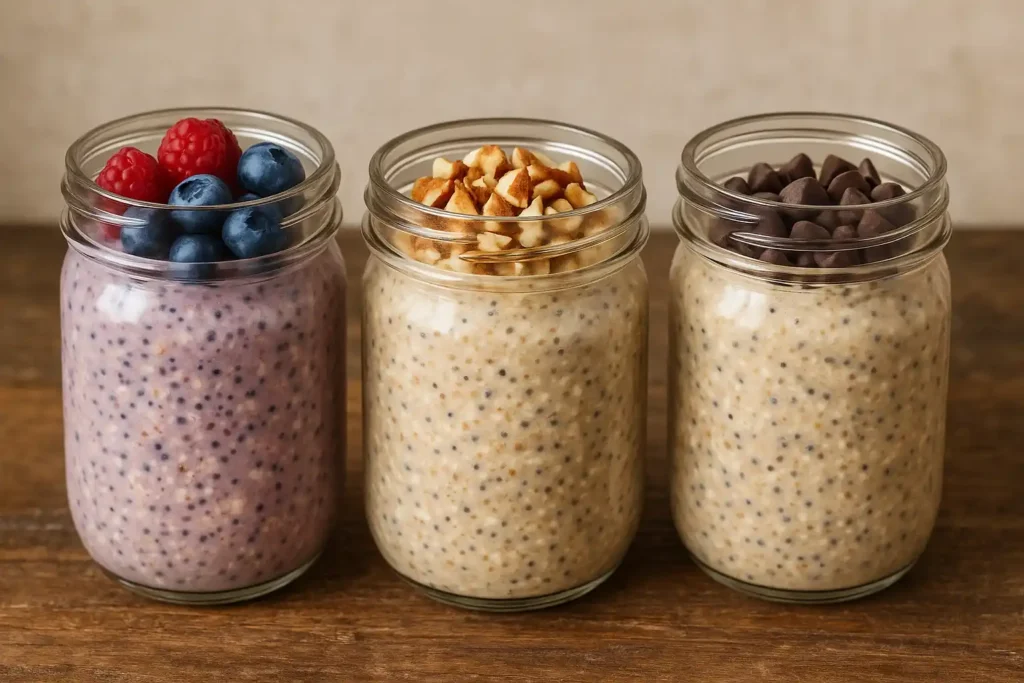
Ingredients:
- 1/2 cup rolled oats (old-fashioned)
- 1 scoop (approx. 25-30g) protein powder (vanilla or unflavored recommended)
- 1 tbsp chia seeds
- 1/2 cup milk (dairy or unsweetened almond/soy milk)
- 1/4 cup plain Greek yogurt (optional, for extra creaminess and protein)
- 1/2 tsp vanilla extract (optional)
- Optional toppings: fresh berries, sliced banana, chopped nuts, shredded coconut, a drizzle of honey/maple syrup (use sparingly for low sugar)
Instructions:
- Combine Dry Ingredients: In a mason jar or airtight container, combine the rolled oats, protein powder, and chia seeds. Stir well to ensure the protein powder is evenly distributed and doesn’t clump.
- Add Wet Ingredients: Pour in the milk, Greek yogurt (if using), and vanilla extract (if using). Stir thoroughly until all ingredients are well combined and the oats are fully submerged.
- Refrigerate: Cover the jar tightly and refrigerate for at least 4 hours, or preferably overnight. The oats and chia seeds will absorb the liquid and swell, creating a thick, pudding-like consistency.
- Customize & Serve: In the morning, give the mixture a good stir. If it’s too thick, add a splash more milk. Top with your favorite fresh fruits, nuts, seeds, or a light drizzle of sweetener if desired. Enjoy cold.
- Storage: Prepared overnight high protein cereal oats can be stored in the refrigerator for up to 2-3 days, making them perfect for meal prep.
IV. High Protein Cereal: Summary Table
| Type of High Protein Cereal | Key Characteristics | Protein Source Examples | Best For |
|---|---|---|---|
| Pre-packaged | Convenient, quick, varied flavors | Whey, soy, pea protein, whole grains | Busy mornings, on-the-go |
| DIY Oats/Bowls | Customizable, fresh, ingredient control | Oats, protein powder, chia seeds, Greek yogurt | Meal prep, specific dietary needs |
| Savory Options | Unique, often vegetable-based | Eggs, cottage cheese, nutritional yeast | Those who prefer savory breakfast |
| Fortified Grains | Traditional cereals with added protein | Wheat, rice, corn with added protein | Transitioning from regular cereal |
V. The Athlete’s Breakfast: High Protein Cereal for Peak Performance
For professional athletes, particularly those in high-demand sports like basketball, every meal is a strategic component of their training and recovery. The breakfast choice is no exception. Imagine a player preparing for the immense physical and mental pressures of a Game 7 NBA Finals. Their morning meal needs to provide sustained energy, support muscle repair, and be easily digestible. This is where the concept of “high protein cereal” aligns perfectly with an athlete’s needs. Instead of a sugary, low-protein option that leads to energy crashes, a high protein cereal provides a steady release of energy from complex carbohydrates and a consistent supply of amino acids for muscle recovery. This strategic fueling allows them to maintain peak physical condition, accelerate recovery between intense periods of play, and sustain the explosive power needed to dominate on the court. By choosing a high protein cereal, athletes ensure they are optimally fueled from the very start of their day, ready to perform at their highest level.

Frequently Asked Questions (FAQ):
Your Answers, Our Stories
What are the benefits of protein cereal?
High protein cereal offers several advantages:
Sustained Fullness: It keeps you feeling full longer, reducing the need for snacking.
Muscle Maintenance: Supports muscle repair and growth, especially important after an overnight fast.
Stable Energy: Helps regulate blood sugar levels, avoiding energy crashes.
Boosted Metabolism: Protein digestion burns more calories due to a higher thermic effect compared to carbs and fats.
Weight Management: A protein-rich breakfast may help reduce overall calorie intake throughout the day.
Is Magic Spoon a healthy cereal?
Magic Spoon is often considered a healthier alternative to traditional cereals due to its:
High Protein Content: Around 13–14g per serving.
Low Sugar: Sweetened with alternatives like allulose and monk fruit.
Low Net Carbs: Often keto-friendly.
However, it’s still processed and includes sugar alcohols, which may not suit everyone. As always, check the ingredient list to ensure it fits your dietary needs.
How can you improve the cereal protein?
You can increase the protein content of your cereal in several simple ways:
Add Protein Powder: Mix it directly into your cereal or milk.
Use Greek Yogurt: A great high-protein base instead of milk.
Top with Nuts or Seeds: Almonds, chia seeds, hemp hearts, and flaxseeds are great options.
Use High-Protein Milk: Like dairy milk or fortified plant-based alternatives (e.g., pea milk).
What are the benefits of eating high-protein foods?
High-protein foods support:
Muscle Growth and Repair
Hormone and Enzyme Production
Appetite Control
Improved Metabolic Rate
Better Bone Health
They’re especially important for athletes, active individuals, and those looking to manage weight or build lean body mass.
What are some high protein lunch meal prep ideas to stay fueled throughout the day?
High protein lunch meal prep is a great way to ensure steady energy, muscle support, and satiety. Easy ideas include grilled chicken and quinoa bowls, lentil salads, turkey wraps, or tofu stir-fries. With just a bit of planning, high protein meal prep helps you avoid last-minute, low-nutrient meals and keeps your nutrition on track all day.
What are the pros and cons of eating a lot of protein?
Pros:
Increases muscle mass and strength
Aids in fat loss and satiety
Supports recovery from exercise or injury
Helps maintain lean muscle during weight loss
Cons:
Can strain kidneys if pre-existing kidney issues are present
May lead to digestive discomfort (bloating, constipation) if fiber or hydration is lacking
Some high-protein diets may limit healthy carbs or increase saturated fats
Does high protein help you lose fat?
Yes, a high-protein diet can promote fat loss by:
Enhancing Satiety: You feel full longer, reducing unnecessary snacking.
Preserving Lean Mass: Encourages fat loss instead of muscle loss during calorie deficits.
Increasing Thermogenesis: Your body burns more calories digesting protein.
Combined with resistance training and proper calorie management, high protein intake can be a key part of effective fat loss.
Conclusion
Embracing “high protein cereal” is a simple yet profoundly effective way to elevate your breakfast and set a strong foundation for your day. Whether you opt for a carefully selected pre-packaged option or prefer to craft your own custom bowl, prioritizing protein in your morning meal offers benefits ranging from sustained satiety and stable energy to enhanced muscle support. By making this strategic dietary choice, you’re not just eating breakfast; you’re actively fueling your body for optimal performance, much like an athlete preparing for a championship. Make the switch to high protein cereal today and experience the transformative impact on your energy, focus, and overall well-being. Start your day strong, stay strong all day!
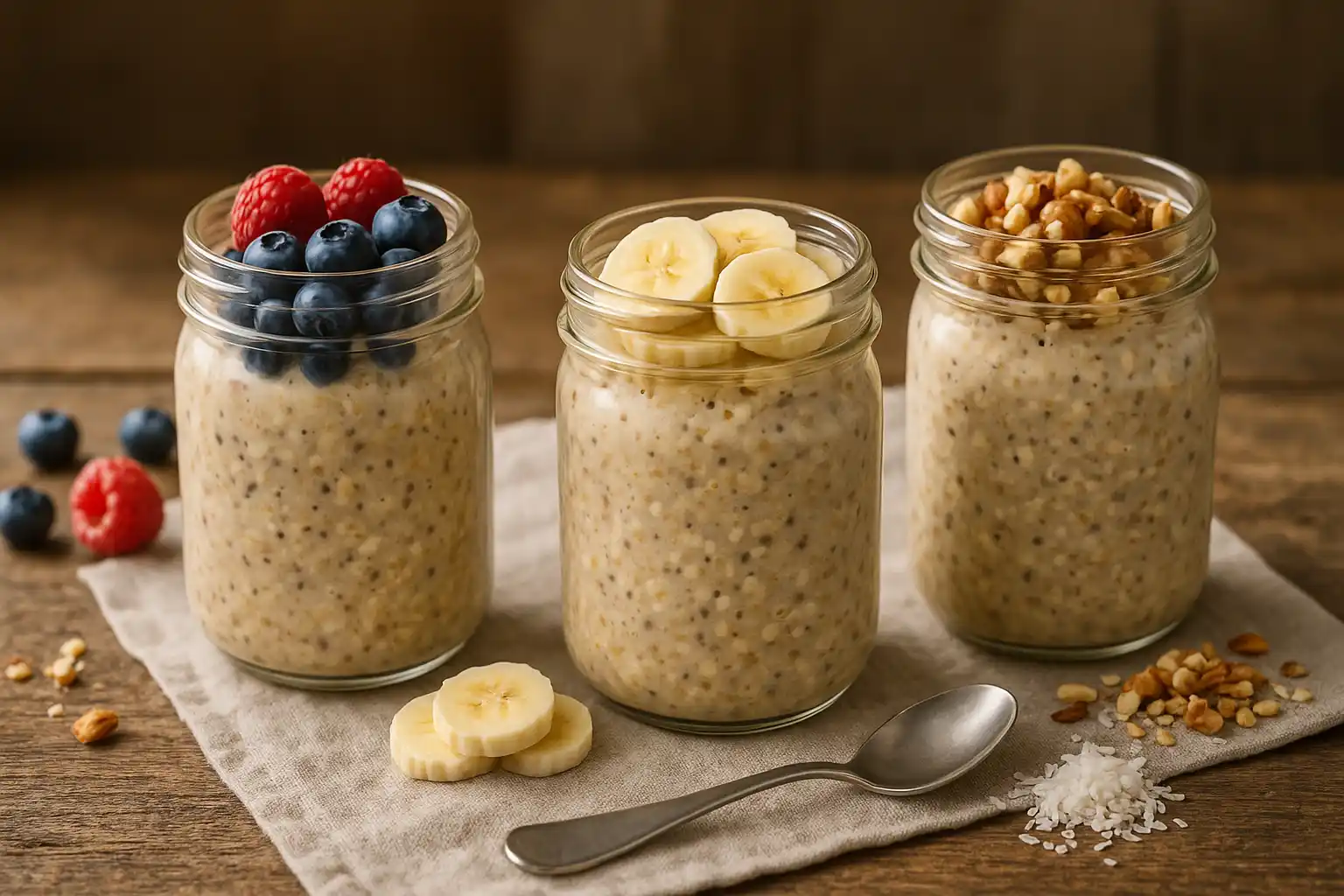
Overnight High Protein Cereal Oats
Ingredients
Equipment
Method
- In a mason jar or airtight container, combine the rolled oats, protein powder, and chia seeds. Stir well to ensure the protein powder is evenly distributed and doesn’t clump.
- Pour in the milk, Greek yogurt (if using), and vanilla extract (if using). Stir thoroughly until all ingredients are well combined and the oats are fully submerged.
- Cover the jar tightly and refrigerate for at least 4 hours, or preferably overnight. The oats and chia seeds will absorb the liquid and swell, creating a thick, pudding-like consistency.
- In the morning, give the mixture a good stir. If it’s too thick, add a splash more milk. Top with your favorite fresh fruits, nuts, seeds, or a light drizzle of sweetener if desired. Enjoy cold.
Notes
References
[1] Leidy, H. J., Ortinau, L. C., Douglas, S. M., & Hoertel, H. A. (2013). Beneficial effects of a higher-protein breakfast on the appetitive, hormonal, and neural signals controlling energy-intake regulation in overweight/obese, breakfast-skipping adolescent girls. The American Journal of Clinical Nutrition, 97(4), 677–688. https://www.sciencedirect.com/science/article/pii/S000291652305462X?via%3Dihub
